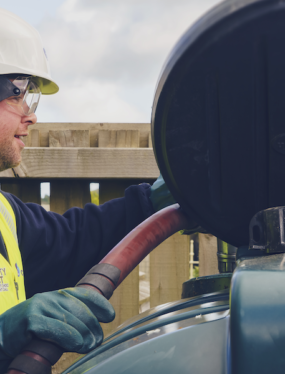In line with changes announced by the UK Government, from 1st April 2022 some Scottish Fuels customers will no longer be able to use rebated red diesel (gas oil) to power their plant, vehicles and equipment. Non-exempt businesses will therefore need to select alternatives to red diesel for use from 1st April 2022, such as white diesel/DERV, Therma35 or clean fuel alternatives, depending on the application. While this is a positive step towards cleaner environment ambitions, such a significant change also presents challenges – a major transition that needs to be planned and managed carefully.
Many business owners are up-to-date on government guidance, but they are still left unsure if the changes apply to them and what steps they must take to stay compliant – at the same time as considering the impact of rising fuel costs hitting their bottom line.
Scottish Fuels is here to help. Over the coming weeks and months, we’ll be sharing valuable resources for “all things red diesel”, including news on the latest regulatory changes and expert guidance for businesses across the range of impacted industries. Let’s kick things off with what every fuel user needs to know right now.
Who will the red diesel duty rule changes apply to?
Red diesel, as a rebated fuel, will no longer be accessible for use in the following industries and circumstances:
- Construction, mining and quarrying
- At ports
- For manufacturing (e.g. ceramics, steel, timber)
- Road maintenance
- Airport operations
- Oil and gas extraction
- Plant hire, logistics or waste management
- Refrigeration units on lorries
Certain industries that use gas oil heavily, such as agriculture and commercial fishing fleets, and non-commercial use cases for heating or power generation, are exempt.
This does not apply to private pleasure crafts. In Northern Ireland, private pleasure crafts will no longer be able to use red diesel from 01 October 2021. Private pleasure crafts in Great Britain will not be impacted by the legislation and will retain their access to rebated red diesel.
For a full list of industries and applications that will still be allowed to use red diesel, see the latest government notification. If the way you use red diesel is not on the list of permissions or exemptions, it is recommended that you check with your local HMRC office to verify your eligibility for rebated fuel.
Wondering if your business or application is exempt? Contact one of our commercial team for additional support.
What should you do to ensure compliance with red diesel duty rule changes?
In order to ensure you remain compliant with government regulations and avoid heavy fines, it is recommended that you start considering options now to begin your transition to alternatives. If your business will no longer be able to use red diesel, then your red diesel stocks will need to be run down before the 1st April 2022 deadline before switching to an alternative fuel. You will also need evidence that the last time you purchased red diesel was not too close to the deadline – proving that you did not stockpile red diesel in quantities that would suggest you intended to use the fuel after 1st April 2022.
Want to get rid of gas oil traces completely? Contact your local team of fuel management experts for more information on bulk and mobile tank and fuel line flushing services.
What are the alternatives to red diesel?
Now is the time to start considering which fuels you could switch to instead of red diesel and how to future-proof your energy mix. As well as standard white diesel/DERV, there are cleaner diesel alternatives that are becoming increasingly available. For example, Shell GTL Fuel as well as hydrotreated vegetable oil (HVO), both of which are drop-in diesel alternatives.
GTL (gas-to-liquid) fuel is a paraffinic fuel produced from natural gas using the Fischer-Tropsch process. This results in a cleaner burning fuel, which reduces local emissions of pollutants (NOx – nitrogen oxide and PM – particulate matter), resulting in improved local air quality. HVO is also a paraffinic fuel, and is produced from renewables such as used cooking oil. HVO’s improved burn efficiency combined with use of non-fossil based feedstocks result in a significant reduction in harmful emissions, including (GHGs) greenhouse gases. Therma35 is also an attractive option for commercial heating applications, due to its burn efficiency and cost savings.
Not sure which red diesel alternatives are right for your business? Talk to your local expert to walk through the available options.
What are the long-term implications?
With red and white diesel often being a target for fuel theft, unfortunately it is anticipated that all undyed/white products will become even more susceptible. All businesses are therefore recommended to explore additional site security options, as well as secure fuel storage solutions.
Fuel efficiency has always been important, and with increased fuel costs, this will remain a key priority for most diesel users. The good news is, there are a number of ways to help reduce your overall fuel usage costs, from learning more about your total cost of ownership through to simply optimising by installing a telemetry system.
Why not talk to the experts about how to become fuel efficient and secure? Contact us now for a no obligation call-back. Scottish Fuels is here to support your transition from red diesel, whatever your industry or fuel application.
Get in touch today on 0345 300 8844 for personalised guidance for you and your business.










